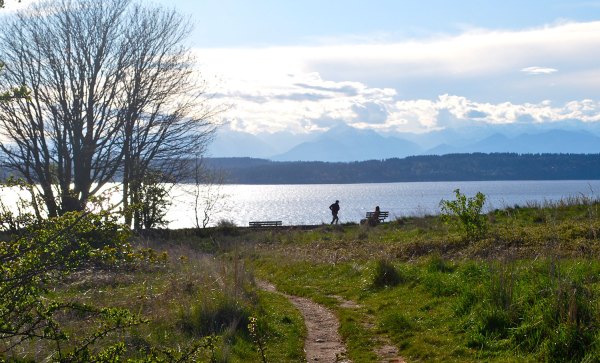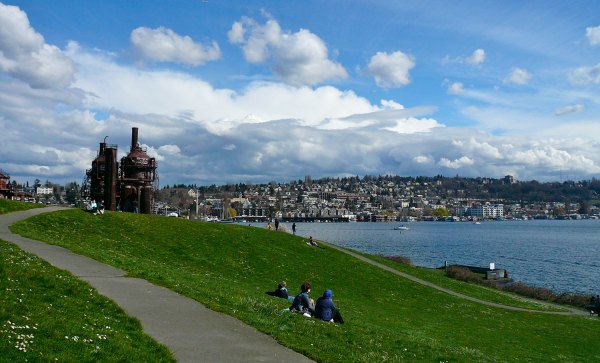Most of us have just a few precious weeks of vacation each year to devote to playing in the wilderness. Rather than spend 50 weeks annually feeling deprived, get inspired with these 12 creative ways to add more nature in your life more regularly—no matter how urban your environs.
1. Link up green spaces in your city.
Most cities have ample and often underutilized green spaces. Get a map of your city—bike maps are great resources for finding greenways and parks—and mark all the designated green spaces you’re interested in exploring. You may be surprised how many options exist that you never even realized were there. If several parks are within a few miles of each other, skip the car or public transport and link up your explorations on a bike ride, run or even a long, leisurely walk.
2. Ask your boss for a flexible schedule.
If your job doesn’t absolutely mandate your physical presence from 9 to 5, Monday through Friday, ask your boss about shifting to an alternate schedule. Try starting your workday at 6 or 7am so you can be done by 2 or 3pm. and still have plenty of daylight hours to seek out adventure. (Bonus: By working “the early shift,” you’ll likely save time on your commute, too, by not traveling during rush hour.)
Or, offer to work four 10-hour shifts each week to free up your Fridays for more ambitious weekend adventures. You might also choose to make Wednesday your bonus day off; who doesn’t love the idea of two-day workweeks?
Alternately, if you can afford a pay cut and want to spend more time outdoors, try negotiating a 30- or 35-hour workweek in exchange for a small reduction in your salary.
3. Buy a headlamp and put it to use.
Even if you are restricted to a traditional work schedule, that still leaves you some 14-16 hours every weekday with which to be flexible. Obviously, sleep is necessary! But, every once in a while, be willing to sacrifice a few hours of it to wake up extra early or stay up late to squeeze in a weekday adventure. Organize a night hike or night bike ride with friends. Or, plan to watch the sunrise from the top of a mountain. Even if the nearest trailhead is an hour away, you can bet there won’t be any traffic as you drive out there at 3am—and you’ll still be able to get back to the office in time for your normal workday.
4. Volunteer.
Committing to regular volunteer work for an outdoor-oriented organization is a great way not only to give back, but to ensure that outdoor time stays penciled in on your own calendar. Research local organizations that do trail maintenance, clean up local parks or help get urban youth outdoors. Offer to help lead a hike or camping trip for your child’s scout troop or friends. Become a mentor and introduce someone else to the joys of spending time in nature.
5. Treat yourself to a spontaneous mid-week day off.
Even if you can’t permanently shift to a more flexible work schedule, don’t relegate all your adventures to one or two times a year by hoarding your vacation time. Instead, enjoy a spontaneous mid-week break by playing hooky (with permission, of course!) on an ordinary Wednesday. Take a day trip out to a nearby park or trail that you don’t get to explore often.
6. Camp out in your backyard.
Just because you don’t have time for a weekend road trip out to somewhere wild doesn’t mean you have to keep your camping gear in storage all year. Break out your tent, sleeping bags and camp stove, and spend a night sleeping under the stars in your own backyard. If you have kids to share this experience with you, all the better! Build a fire, make s’mores, tell stories, and go to work the next day with the distinctive scent of campfire smoke still infused in your hair.
7. Lobby for a staff retreat outdoors.
Staff development in the outdoors is all the rage these days. If you work for an outdoors-oriented company, perhaps this kind of policy is already in place. If not, print out a few studies or articles that point to the value of outdoor time and share them with your boss. A ropes course, staff hike or paddling trip may be a welcome changeup in routine for everyone.
8. Spend some time near a body of water.

You don’t have to embark on a multiday sea-kayaking trip to enjoy the beauty and calm of a sparkling body of water. Many beaches, bays, rivers, and lakes in state or city parks offer inexpensive equipment rentals—check out a paddleboat, kayak, canoe, stand up paddle board or float-tube. Take advantage of these opportunities to get on the water, even if just for an hour or two after work. Or, pack a picnic basket, card game and some books to enjoy by the water’s edge, whether you’re alone or with friends or family.
9. Try geocaching.
A kind of modern-day scavenger hunt, geocaching is a fantastic and family-friendly way to discover new places, even in urban locales. More than a million caches exist worldwide, waiting to be found by anyone enthusiastic about treasure hunting and exploration. Geocaching is also a great way to practice your GPS navigation skills. Learn more here on how to get started.
10. Change up your commute.
Spending time stuck in traffic can be one of the greatest stressors of living and working in a city. Maximize your fresh air by commuting to work on bike or on foot at least one day a week. For health or environmental reasons, some employers will even offer financial incentives to help employees try alternative commuting.
11. Sleep on top of a mountain.
Find a local peak that permits camping on or near the summit. Long daylight hours in the summer permit plenty of time to squeeze in, say, a four-hour round-trip hike on a weeknight. Load up your backpacking gear before work one day, head straight to the trailhead after work, hike up and pitch a tent. You’ll still get a decent amount of sleep before basking in the sunrise from atop a mountain, hiking down and being at your desk at a decent hour the next morning.
12. Remember that cities are a wilderness all their own.

Avoid seeing the outdoors and the city at odds with each other. Many of the experiences or qualities we seek in nature—exploration, adventure, beauty, quiet, wildlife, flora, solitude (or, for that matter, camaraderie)—exist in urban environs, too. Climb a tree. Try parkour. Hike to the top of a large hill in the city and watch a sunrise or sunset. Get to know the sounds of the birds that frequent your neighborhood. Learn about edible plants and berries and go foraging. Above all, be present in the moment and appreciate the beauty of whatever environment in which you find yourself.
Have more ways on making the most of out-of-work hours? Please share in the comments below.
